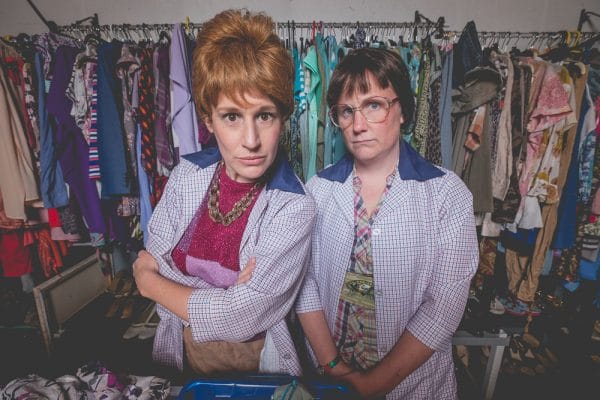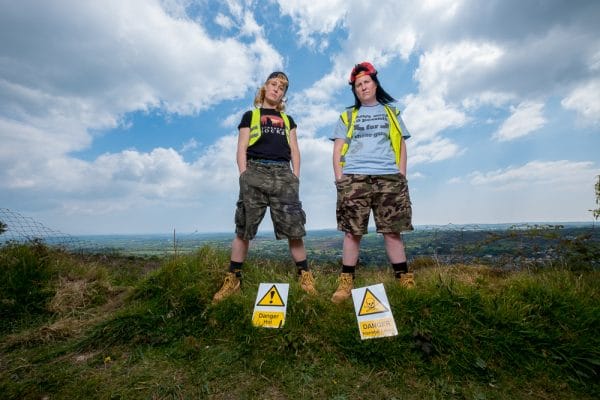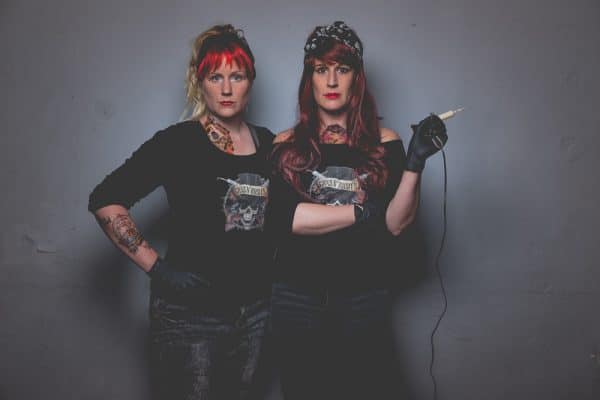You know it’s been a bad start to the day when the guy making you a coffee checks you’re alright. ‘You totally zoned out there for a second,’ he laughs as I try for the third time to place my order, struggling to hold even the simplest list in my head. Why? Because it’s the Monday after Oscar night. And I am simultaneously sleep-deprived and distracted by the thought of brilliant, funny women dismantling the machine from the inside out. From Tina Fey, Amy Poehler and Maya Rudolph not-host hosting, to Frances McDormand’s cheeky zipped lip, I revelled in the palpable sense of sea change in the auditorium. Not to mention the woman who thwarted Glenn Close’s chance to grip a little gold man by the neck and lift him sky high (but apologised profusely for it ‘you’ve been my idol for so long, this is not how I wanted it to be’).
Down to earth. Engaging. Giving. And still uber talented? How does Olivia Colman do it? Well, like all the other funny creative women out there I imagine, now hopefully buoyed in their own practice by her recognition and rise. Women like Sally Crooks and Kyla Goodey. Who are waiting for me as I fail to order two cappuccinos and a long black. And who together have been playing the down to earth, engaging, giving and talented card, as theatre company Trifle Gathering for over 16 years.

Down to earth.
Born from Goodey’s weird and wonderful imagination and bolstered by Crook’s practical and creative expertise, Trifle Gathering’s anarchic satire is small, well-formed and proud to be a little bit ludicrous. This is theatre that celebrates the absurdity of life and invites its audience to be a part of the story. Whether it’s charity shop workers ready to give you a piece of their mind, a trio of spooky sisters stumbling their way through a séance or a ‘90s progressive-dance-industrialist-folkoronica band riding the current reunion wave, their work is always character-driven, their stories life affirming, their shows just goddam funny.
“We like to write about people whose dreams are a little bit out of reach,” explains Goodey. “Our characters are always striving and never quite make it. There’s something in there about being normal but with a dream that people can relate to, however daft the framing. I think all of us identify with that. It’s probably what I feel about myself – we make work that we relate to, because we’re making work for people like us.”
It feels more absurd than the content of one of their shows to be sat discussing how normal and everyday these talented humans are, when from the outside their company is creating inventive, unusual, exciting work, and their own craft – In 2017 Goodey directed and starred in WildWorks’ Wolf’s Child, following it up last year by directing the company’s epic promenade drama 100:Unearth – is turning heads across the South West and beyond. But appearances can be deceptive. And self-effacement endearing.
“There’s something in there about being normal but with a dream that people can relate to, however daft the framing. I think all of us identify with that."
“A lot of the time we feel clumsy and we feel a little bit naïve in all honesty,” Goodey continues. “We don’t always think about PR and promotion and communication first off. We just start with doing something we want to do and sometimes it can feel like we’ve dropped the ball a bit on the rest of the stuff.” Although what they see as ‘dropping the ball’ critics and fans have read as organic, authentic growth – slow builds becoming cult classics, like Goodey’s much-loved character Elspeth and her Charity Shop gang. “Yeah, perhaps we are quite capable,” Crooks thinks out loud, as if she’s realising it as she’s talking. “With past productions we’ve done all the set design, marketing, writing, performance; we’ve taken shows to the Fringe and done all that ourselves. But we were ten years younger so maybe it wasn’t as tiring.”
And things were different back then. There were no ‘austerity measures’. No streaming. No dwindling disposable income. In fact, the landscape for small theatre companies right now is probably the most challenging it’s been for a long while. Something Crooks is acutely aware of. “We’re obviously in an incredibly privileged position to be able to do work we love, but times are very tough across the industry at the moment,” Crooks continues. “The show we’re currently working on took three years to fund. A lot of our friends making work are feeling it too. The pinch is definitely there. For audiences too. People are broke and not willing to take a punt on something when they have a boxset waiting at home.”
She’s not wrong. We’ve probably all been faced with the choice of going out or catching up on some essential binge viewing and opted for the sofa. “I mean we can’t even get away from Netflix ourselves, let alone expect our audience to,” Goodey adds. “A boxset that’s worth 3 million pounds an episode is quite a competition for us pootling around in our van with some absurd comedy. It’s a tricky sell.”
Engaging.
So why do they keep doing it? When both of them have successful careers as actors, directors, writers and practitioners in their own right? “When you’re working with other companies suddenly you find yourself at a table leading 120 artists. And that is incredible, to have a team that can help you realise the vision,” she continues. “The difference is you have to fit in their mould. Because it’s their show. With us, it’s all about our instinct. It’s about taking the risk and maybe it’s a twatty risk, but within that twattiness is the style of our work. That’s what people know us for and hopefully what people relate to.”

It’s true that people expect a certain something from a Trifle Gathering show. Much of which hinges on that dreaded phrase ‘audience participation.’ “We prefer to see it as creating a one-off community each night,” Crooks laughs, “it’s really important to us. Certainly over the last four years we’ve realised that we like to build a relationship with the audience so they are part of the story, not apart from it. Everyone involved gets so much more that way. They have a very active role and in that we build what feels like a unique event because we’re inviting them to participate on such a huge level.”
“It keeps us all awake,” Goodey adds. “Things are different every time because you just don’t know what’s going to happen. Although we also understand the pain of traditional audience participation so we really do design each show so it doesn’t feel like that. We want people to come because they want to experience the story through that interaction, not in spite of it.”
“With us, it’s all about our instinct. It’s about taking the risk and maybe it’s a twatty risk, but within that twattiness is the style of our work. That’s what people know us for and hopefully what people relate to.”
And people are. Against the broadsweep challenges live performance is struggling with, immersive theatre is having something of a moment. Steadily growing over the last decade, and spearheaded by innovators like Punch Drunk theatre, companies around the globe are offering immersive experiences of all kinds. Wandering around Gatsby’s private party. Being drafted as protestors or observers to fight out the Kiev uprising. Solving a mystery buried behind the books of Kensington library. Audiences are beginning to expect more from their ticket than just static in-their-seat entertainment. They want a moment they will remember. Something to talk about and share. A surprise, or secret or element to discover that takes their night out to a new level. “It’s definitely encouraging to see the growing appetite for that sort of thing,” Goodey continues. “For the younger crowd they want to be involved in the theatre. They don’t want us to perform at them, so we are beginning to think even more about how we can make work that meets that demand.”

Work like a live tattoo parlour that gets audience members to sit under the gun and experience the lives, loves and losses of the inking artists firsthand. “We’re playing with that line of ‘is this really happening, for real?’” Crooks continues. “It’s very knowing, our audiences are in on the joke and embrace it, then it’s up to them how far they take it.” The new show they’re working on too, blurs the line between truth and fiction and invites audiences to be a part of the world, before, during and after the show. A documentary-style live performance charting the pockmarked reunion of nineties to noughties progressive-dance-industrialist-folkoronica quartet N:DLESS, building the storyworld in a way that people can really buy into has been a step up for Crooks and Goodey, but one they are relishing. “Because the show is about music, there’s a shared experience there that everyone has – going to gigs, the feeling of camaraderie, the connection with a time and place that music can create, it’s all stuff we can play with,” Goodey continues. “You’re asking people to let go of whether it’s real or not, to enjoy the ambiguity, to find themselves trying to remember if N:DLESS formed part of the soundtrack to their own youth – and to not be bothered about the truth behind the answer.”
Giving.
“We’re definitely celebrating live gig performances,” Crooks adds. “The joy of that shared experience when you’ve stood in a crowd and felt that wave of, ‘oh my god, it doesn’t get better than this.’” Sharing something and being in it together sits at the heart of the way Trifle Gathering works, across the board.

Whether it’s an open invitation to the audience to join in, a collaboration with the media to build up a pre-show story that everyone can believe in, or even just the sense of having each other’s back as artists, Crooks and Goodey value relationships above all else. “We’ve always been about supporting each other,” Crooks continues, “to create the work we want to create or to pursue our own personal ambitions. We make room for all of that and make sure we are both having a good time in the process. Working in that way is how we get the best out of everyone. How we make sure our actors, our audience, ourselves all have a good time.”
“We all know creative funny women. They’re everywhere. Because that’s what women are in our essence. We shouldn’t get hung up on it, but we do need to make room.”
Everyone having a good time. That’s what leads to great work. It’s not exactly complicated but it feels like it’s taken a long while for the world to catch up with what all of us already know. That funny and interesting can come from anyone and everyone, so the stories we watch should reflect that. “I’ve been very angry in a lot of rehearsal processes and found myself thinking ‘I’m this again, so you’ve given me this again,’ Goodey admits. “Oh so I’m serving their story. Oh so it’s another story about a man’s journey. Oh so we’re going to do Hamlet and I’m going to play the tragic girlfriend who commits suicide. I’ve had a career of that and it’s just frustrating and disappointing. So for us to find our own pocket where me and Sally can support each other and write and play great characters and have fun with them and put them out there and most importantly get a good response is so empowering. Maybe it is a sign that things are about to change…”
I mention the Oscars. And Colman. I ask if the reception she’s received, in her down-to-earth, relatable, brilliant glory is perhaps part of the entertainment industry shifting to be an all round nicer place. Goodey frowns. “The risk is that the world gets fixated on individuals, like there’s only room for one funny, kind, creative woman. There’s a lot of brilliant women out there, so we need to be opening the doors as much as we can to see more of them, together on stage or on screen.”
Crooks nods. “We all know creative funny women. They’re everywhere. Because that’s what women are in our essence. We shouldn’t get hung up on it, but we do need to make room. Because there’s also that feeling, we’ve definitely experienced it of, ‘OK we’ll allow you to be funny, but just this one line, or just this one bit,’ that it’s still a world you’re in that isn’t yours,” she says. “I know things are changing though, even if it’s slow. There are guidelines on it now. For example if you’re writing a film they’ll say, ‘if there’s no good reason why the protagonist shouldn’t be female, you should make the protagonist female.’ Which is exciting, because that should open the doors.”
Point made. There’s more to this paradigm shift than Olivia Colman.* And there’s more to entertainment than sitting on a sofa with Marie Kondo for company. And if we are willing to take the risk and spend a few quid and embrace the silliness, we might just share a memorable moment where brilliantly funny creative humans highlight the absurdity of life in all its glory. And realise we are not alone.
Sounds like a good enough reason to leave the boxset behind for a night to us.*
+
*This article was sponsored by sleep deprivation and Olivia Colman.**
** It actually wasn’t. Well, not the Olivia Colman part anyway.
—
Images courtesy of Lee Searle